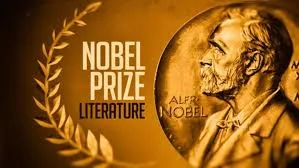The Nobel Prize in Literature - is one of the most prestigious literary awards in the world, recognizing outstanding contributions to literature. Established in 1895 through the will of Alfred Nobel, the Swedish inventor, engineer, and philanthropist, the prize has been awarded annually since 1901 to authors, poets, playwrights, and essayists whose work has had a significant impact on the global literary landscape.
Alfred Nobel, best known for inventing dynamite, left a portion of his fortune to fund a series of prizes that would honor achievements in physics, chemistry, medicine, peace, and literature. The Nobel Prize in Literature is awarded by the Swedish Academy, an independent cultural institution based in Stockholm. According to Nobel's will, the prize should go to an author who has produced "the most distinguished work of an idealistic tendency" in the field of literature. Over time, this phrase has been broadly interpreted, allowing for a diverse range of voices and genres to be considered.
Selection Process
The selection process for the Nobel Prize in Literature is meticulous and confidential. Each year, the Swedish Academy invites qualified nominators—such as literary scholars, professors, past laureates, and members of literary societies—to submit nominations. These nominations are then reviewed by a committee within the Academy, which shortlists potential candidates based on their literary merit, originality, and the depth of their work. The deliberations are kept secret, and the winner is typically announced in October.
The Nobel Prize in Literature does not have specific criteria for the form of writing that is honored. Winners have included novelists, poets, playwrights, essayists, and even historians. The Academy has honored authors from around the world, writing in various languages, thus highlighting the universal importance of literature as a medium of human expression. Some laureates are selected for their lifetime of work, while others are recognized for a single, groundbreaking book.
Notable Laureates
The list of Nobel Literature laureates reads like a who's who of global literary giants. It includes such towering figures as Rabindranath Tagore (1913), the first non-European laureate, whose poetry and prose introduced the West to the richness of Bengali literature. William Faulkner (1949) and Ernest Hemingway (1954), both from the United States, helped define 20th-century American literature, while Gabriel García Márquez (1982) brought magical realism to the forefront of world literature with his masterpiece *One Hundred Years of Solitude*.
European authors have also been central to the Nobel tradition. Irish playwright George Bernard Shaw (1925), French existentialist philosopher Jean-Paul Sartre (1964), and Polish poet Wisława Szymborska (1996) are just a few examples of laureates whose works have had a profound impact on modern thought and literature. Sartre famously declined the prize, stating that he did not wish to be "institutionalized," though the Swedish Academy still recognizes him as a laureate.
In recent years, the prize has been awarded to a more diverse array of voices, including writers from Africa, Asia, and Latin America, reflecting the evolving global literary landscape. African laureates like Wole Soyinka (1986) from Nigeria and Naguib Mahfouz (1988) from Egypt have been honored for their contributions to post-colonial literature and cultural identity.
Controversies and Criticism
While the Nobel Prize in Literature is widely respected, it has not been without controversy. Over the years, critics have questioned the Swedish Academy’s choices, often accusing it of favoring European or Western authors over those from other parts of the world. Some argue that the award has sometimes overlooked important literary movements or figures, especially in non-European languages.
One of the most notable controversies occurred in 2018, when the prize was postponed due to a scandal involving sexual misconduct allegations within the Academy. The following year, two prizes were awarded, one for 2018 and one for 2019, in an effort to make amends.
The award has also sparked debate when unconventional choices have been made. For instance, in 2016, American singer-songwriter Bob Dylan received the Nobel Prize in Literature, a decision that stirred discussion about the boundaries of literature and what forms it can take. Some hailed the decision as a recognition of the literary merit of songwriting, while others felt it was a departure from the traditional concept of literary achievement.
Impact and Legacy
The Nobel Prize in Literature carries immense prestige, often boosting the global recognition of its recipients and sometimes transforming them into household names. It is accompanied by a monetary award, which varies depending on the Nobel Foundation’s finances, but more importantly, it serves as a lifelong honor that can elevate the work of authors whose voices might not have been widely recognized before.
Many laureates have used the platform provided by the Nobel Prize to speak out on issues of social justice, human rights, and the role of literature in shaping society. This reflects the wider mission of the Nobel Prizes, which aim to honor not just technical or artistic excellence, but also the promotion of ideals that contribute to the betterment of humanity.
In conclusion, the Nobel Prize in Literature stands as a beacon of literary achievement, recognizing authors who have expanded the horizons of human thought and imagination. Its winners come from all corners of the world, representing diverse languages, cultures, and perspectives. Despite occasional controversies, the prize remains one of the highest honors a writer can receive, celebrating the enduring power of literature to inspire, challenge, and connect people across the globe.
















0 Comments